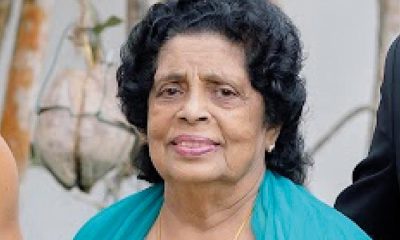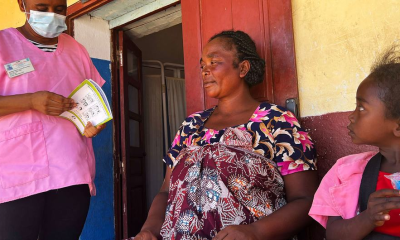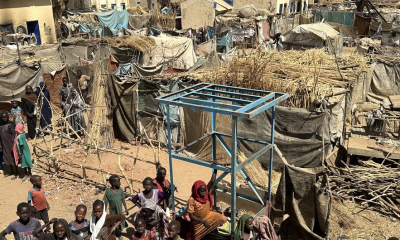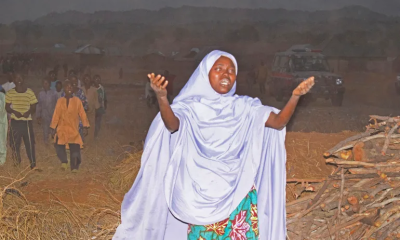News
One third of SL children undernourished: UNICEF-OPHI study
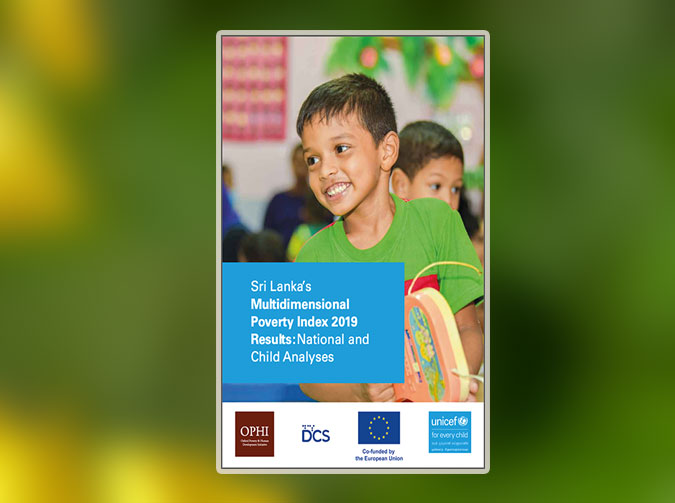
A startling 42.2 per cent of the 0-4-year-old Lankan children are multidimensionally poor, a study conducted collectively by the Department of Census and Statistics (DCS), the United Nations Children’s Fund (UNICEF) Sri Lanka and the Oxford Poverty & Human Development Initiative (OPHI) at the University of Oxford revealed.Based on data from the Household Income and Expenditure Survey 2019, the study’s report says that an alarming one third of children are undernourished.
“It is disheartening that more than 4 in 10 children under the age of 5 years are multidimensionally poor, that is, they are being deprived of several factors that are key to their wellbeing, specifically nutrition, care and stimulation. Multidimensional child poverty is much higher than the national average based on the national MPI, with 1 in 6 people living in poverty. This finding reproduces a global pattern, namely that children often suffer disproportionately from poverty,” says the executive summary of the report titled ‘Sri Lanka’s Multidimensional Poverty Index 2019 Results: National and Child Analyses.’
This report presents the official national Multidimensional Poverty Index (national MPI) and child Multidimensional Poverty Index (child MPI) complementing the monetary poverty measures published by the Department of Census and Statistics (DCS) in Sri Lanka. These indexes cover the different dimensions of nonmonetary deprivations experienced by poor people and children at the same time. The report provides a comprehensive picture of poverty for evidence-based policy decisions to achieve the Sustainable Development Goal 1, Target 1.2, Indicator 1.2.2 “End poverty in all its forms everywhere” as per the national definition with the concept of the “no one left behind” principle.
The report sheds light on the multiple deprivations experienced by the poor in Sri Lanka- one out of every six people is multidimensionally poor by the national MPI (16%) and their deprivations vary greatly by district and age. It also finds that those living in multidimensional poverty are not necessarily poor in monetary terms. Furthermore, by the linked child MPI, 42.2% of children 0-14 years old are multidimensionally poor and an alarming one third of children are undernourished. Sri Lanka’s child MPI is pioneering in being the first official measure of child poverty that links directly and consistently with the national MPI: they both include the same indicators, while a fourth dimension covering undernutrition and early childhood development is added to the linked child MPI.
The DCS has compiled national MPI and child MPI as official statistics, for the first time in history for the year 2019 using the data from Household Income and Expenditure Survey 2019 (HIES 2019). This report is an outcome of the collaborative exercise done by the DCS, the OPHI and the UNICEF Country Office in Sri Lanka.
Sri Lanka’s national MPI is the first MPI in the world to directly and fully link the individual measure of child poverty with national poverty, also known as the ‘drawer approach’. The national MPI in Sri Lanka has 10 indicators grouped into three dimensions: Education, Health and Standard of Living. The individual and pioneering child MPI for children aged 0–4 includes the same indicators as the national MPI and adds a fourth dimension to cover undernutrition and early childhood development.
The national MPI is 0.067 for Sri Lanka in 2019. It indicates that poor people in Sri Lanka experience only 6.7 per cent of the deprivation that would be experienced if all Sri Lankans were deprived in all indicators. The multidimensional poverty headcount ratio is 16 per cent at national level and the poverty rate of urban, rural and estate sectors are 4.4 per cent, 16.6 per cent and 51.3 per cent respectively. Monetary poverty in Sri Lanka is 14.3 per cent in 2019.
News
US sports envoys to Lanka to champion youth development

The U.S. Embassy in Colombo welcomed the U.S. Sports Envoys to Sri Lanka, former National Basketball Association (NBA) and Women’s National Basketball Association (WNBA) players Stephen Howard and Astou Ndiaye, from June 8 through 14.
The Public Diplomacy section of the U.S. Embassy said that it would launch a weeklong basketball program intended to harness the unifying power of sports, made possible through collaboration with Foundation of Goodness and IImpact Hoop Lab.
While in Sri Lanka, Howard and Ndiaye, both retired professional basketball players, will conduct a weeklong program, Hoops for Hope: Bridging Borders through Basketball. The Sports Envoys will lead basketball clinics and exhibition matches and engage in leadership sessions in Colombo and Southern Province for youth aged 14-18 from Northern, Uva, Eastern and Western Provinces, offering skills and leadership training both on and off the court. The U.S. Envoys will also share their expertise with the Sri Lanka Basketball Federation, national coaches, and players, furthering the development of basketball in the country. Beyond the clinics, they will collaborate with Sri Lankan schoolchildren to take part in a community service project in the Colombo area.
“We are so proud to welcome Stephen and Astou as our Sports Envoys to Sri Lanka, to build on the strong people-to-people connections between the United States and Sri Lanka,” said U.S. Ambassador Julie Chung. “The lessons that will be shared by our Sports Envoys – communication, teamwork, resilience, inclusion, and conflict resolution – are essential for leadership development, community building, equality, and peace. The U.S. Sports Envoy program is a testament to our belief that sports can be a powerful tool in promoting peace and unity.”
News
Rahuman questions sudden cancellation of leave of CEB employees

SJB Colombo District MP Mujibur Rahuman in parliament demanded to know from the government the reasons for CEB suspending the leave of all its employees until further notice from Thursday.
MP Rahuman said that the CEB has got an acting General Manager anew and the latter yesterday morning issued a circular suspending leave of all CEB employees with immediate effect until further notice.
“We demand that Minister Kanchana Wijesekera should explain this to the House. This circular was issued while this debate on the new Electricity Amendment Bill was pending. There are many who oppose this Bill. The Minister must tell parliament the reason for the urge to cancel the leave of CEB employees,” the MP said.However, Speaker Mahinda Yapa Abeywardena prevented Minister Wijesekera responding to the query and said that the matter raised by MP Rahuman was not relevant.
News
CIPM successfully concludes 8th Annual Symposium

The Chartered Institute of Personnel Management (CIPM) successfully concluded the 8th Annual CIPM Symposium, which took place on 31st May 2024. Themed “Nurturing the Human Element—Redefining HRM in a Rapidly Changing World,” the symposium underscored the pivotal role of human resource management (HRM) in today’s dynamic global landscape. Since its inception in 1959, CIPM has been dedicated to advancing the HR profession through education, professional development, and advocacy, solidifying its position as Sri Lanka’s leading professional body for HRM.
Ken Vijayakumar, the President of the CIPM, graced the occasion as the chief guest. The symposium commenced with the welcome address by the Chairperson, Prof. Arosha Adikaram, followed by the Web Launch of the Symposium Proceedings and Abstract Book by the CIPM President. The event featured distinguished addresses, including a speech by Chief Guest Ken Vijayakumar, President of CIPM, and an address by Guest of Honor Shakthi Ranatunga, Chief Operating Officer of MAS Holdings Pvt. Ltd., Sri Lanka.
The symposium also featured an inspiring keynote address by Prof. Mario Fernando, Professor of Management and Director of the Centre for Cross Cultural Management (CCCM) at the University of Wollongong, Australia.
Vote of Thanks of the inauguration session was delivered by Dr. Dillanjani Weeratunga, Symposium Co-chair.
The symposium served as a comprehensive platform for researchers to present their findings across a wide range of critical topics in HRM. These included Cultural Diversity and Inclusion, Talent Development and Retention, Ethical Leadership and Corporate Social Responsibility, Adapting to Technological Advancements, Mental Health and Well-being at Work, Global Workforce Challenges, Employee Empowerment, and Reskilling and Upskilling.
The plenary session was led by Prof. Wasantha Rajapakse. Certificates were awarded to the best paper presenters during the valedictory session, followed by a vote of thanks delivered by Kamani Perera, Manager of Research and Development.
The annual symposium of CIPM was a truly inclusive event, attracting a diverse audience that spanned undergraduates, graduates, working professionals, research scholars and lecturers. This widespread interest highlights the symposium’s significance in the field of HRM, offering a unique opportunity for everyone to network and learn from scholarly brains.The CIPM International Research Symposium was sponsored by Hambantota International Port, Sri Lanka Institute of Information Technology (SLIIT), E B Creasy & Co. PLC, and Print Xcel Company.






